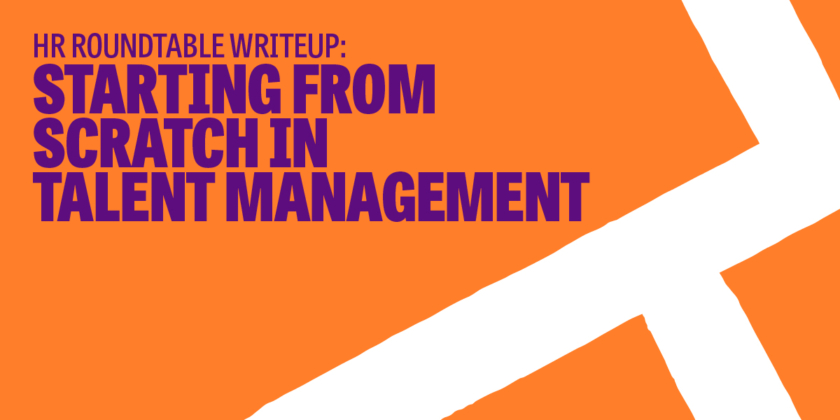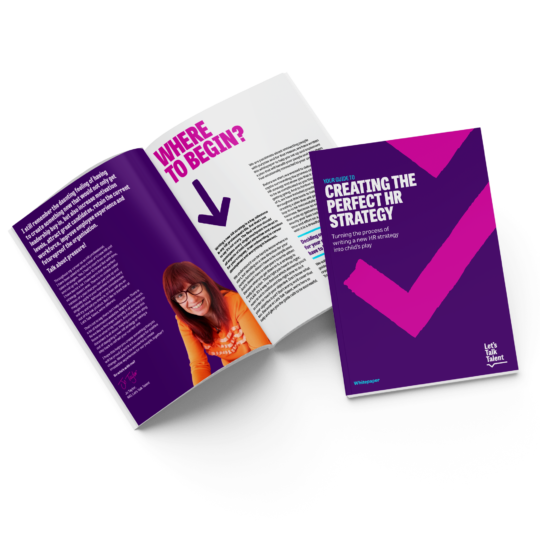What we’ve learnt from our virtual roundtable
At Let’s Talk Talent, we know it’s a bit harder these days to connect with fellow HR professionals, exchange ideas and share on the challenges we are experiencing as part of the new normal. This is why we were delighted to host a virtual roundtable to discuss how to start a talent management strategy from scratch, with some of our favorite clients and colleagues. Actually, we should say co-hosted as this one was expertly led by Kelly Black from City Football, who shared her experience of implementing new talent initiatives throughout her career. Warts and all. Here are some of the key learnings we’ve taken away from the session.
Out with the old
When it comes to talent attraction and retention, things have changed a lot over the years. Organisations can no longer afford to have a parent-child relationship with employees if they want their talent pool to grow and develop the skillset needed to perform well. It’s time to shift the focus and put the right level of accountability on the right people. Accountability for their performance, and for their career progression. At Let’s Talk Talent, we’ve observed that nearly 90% of coaching sessions are centered around helping staff to progress their career: a clear indicator that they are keen to take ownership of their own professional development.
But for such a shift in accountability to take place, it requires a shift for managers too. Employees need the right tools, support and frameworks in order to get to the next level of their careers. And whilst opinions around the table were still divided around competency models and their relevance in today’s HR world, we all agreed that the management skills expected of today’s leaders have evolved from what they were ten years ago. In order to take charge of their development, people require leadership based on resiliency, empathy and emotional intelligence. But whilst expectations have changed for managerial staff, those actually filling the role may not have. Tensions can often be felt between the old authoritarian style and the new model.
This is extremely relevant during the COVID-19 pandemic. The UK’s workforce is realising they have options available and they seem much more inclined to make different career choices than they may have been pre-lockdown. Many are realising what is important to them in a career, whether it is the flexibility to work from home or simply an organisational culture based on trust, and they are willing to act. The way they were treated during the crisis will also influence their views on whether their current organisation aligns with their core values.
Have patience
Taking away the trusted competency models whilst starting a new talent management strategy from scratch can be freeing. But if you remove the old boundaries and give yourself permission not to have a rulebook, where do you even start?
Kelly’s main tip is simple. Don’t feel like you have to rush into fixing problems straight away. Taking the time to stop and listen is key. The initial observation period is essential for any HR professional tasked with creating a plan focused on getting results.
Our co-host also had one additional piece of advice to help sell this process to the business: be transparent with stakeholders about what you’re doing. Whilst the scoping phase is crucial, some may perceive it as inactivity. Communicating your plan, its milestones and end goal will help add value.
Shift the onus from HR to the whole business
The Q&A section of our roundtable also brought up some interesting questions around talent management strategies. More particularly, how to make them stick. We’ve all been part of various organisations where tools, models and frameworks have been adopted, scratched and replaced by newer or different approaches. So as HR professionals, how can we ensure any newly implemented talent management programme lasts the distance?
Both Jo, our MD, and Kelly agreed on that point. It’s not the HR department’s job to make it stick. It’s everyone’s. Whilst the organisation’s central HR function can help create the right environment, ensuring the success of a new talent management strategy is a communal obligation. Just like a conductor, at the helm to ensure all the constituent part of the orchestra are filling their roles and working well together, your HR department is there to facilitate the process. But the whole business needs to be involved in reviewing results, determining if things are working and finding ways to course-correct along the way.
So in this case, how do you ensure buy-in from all areas of the business? One concrete way to do this and put the ownership back into the business is through pilot projects. Jo believes that moving away from big launches allows HR functions to focus their energy on putting accountability for the initiative’s success on the right people, as well as slowly create energy and build momentum to roll the programme out to a wider audience.
Conclusion
Overall, the word of the day was patience and persistence. More than ever, we are moving from the old world to the new and many will be trying to find their feet. The implementation of a new talent management program may generate clashes between the traditional, hierarchical ways of thinking and the more modern collaborative approach. Introducing change slowly is the only way to bridge the gap.
We all know that talent management is never done. And Kelly believes that not being a perfectionist has helped her focus on evolution rather than perfection. Movement and progression are the only true success factors in the implementation of a new talent management strategy and getting to know your organisation slowly through smaller pilot projects will allow you to become more targeted and eventually make bolder choices based on past empirical data.
We thoroughly enjoyed our discussion on this topic and wish to thank all those who took part in the event. Particular thanks to Kelly Black for leading the session and sharing her invaluable insights. We hope to see you at the next event!

